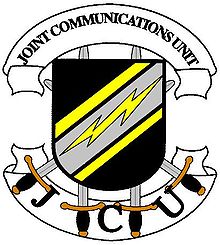Joint Communications Unit
The Joint Communications Unit ( JCU ; German United Telecommunications unit ) is a part contending force overarching technical special unit for telecommunications and telecommunications services of all kinds It is part of. US Joint Special Operations Command (JSOC), a composite command, which for the global fight against terrorism the US forces responsible .
assignment
The Joint Communications Unit ensures the entire technical communication of all units of the JSOC, during rest periods and during operations. Especially in covert operations behind enemy lines, she ensures that contact with the operators of the Delta Force or Naval Special Warfare Development Group (formerly Seal Team 6) does not break off. She is responsible for the technical standardization and compatibility of the means of communication with higher commands and other US authorities, such as the CIA and NSA . The JCU is able to maintain communication under all conceivable conditions and from a wide variety of platforms (vehicles, aircraft, ships, etc.).
She is also responsible for the JSOC's communications with the National Command Authority (NCA).
organization
The JCU is stationed together with other units of the JSOC in Fort Bragg , North Carolina . Since the JCU is a composite unit, telecommunications specialists from all branches of the armed forces serve in it. This mixed association concept is intended to ensure that there are no “frictional losses”, rivalries or misunderstandings between the individual armed forces.
Recruitment and training
The unit recruits its logistics, telecommunications, computer and electronics experts from all branches of the armed forces. The key here is less the distribution key than individual qualifications and teamwork. Civil specialists can also apply.
Since the JCU is an airborne unit , i.e. completely suitable for jumping, aspirants may have to acquire this ability at the US Army Basic Airborne School . Due to their special unit status, in addition to the technical requirements, the aspirants also have to meet very high demands. The training covers the areas of UHF and SHF satellite systems , LAN, WAN and IDNX systems, installation of fiber optic systems and other state-of-the-art communication technology.
equipment
Due to the task at hand, the unit has the most modern communication technology available. It is not dependent on the normal procurement channels of the US military, but purchases equipment on the world market or from other federal agencies (for example from the NSA or CIA), if necessary. Particularly with regard to the adaptation of the communication channels with these services, it can happen that the JCU has technology at its disposal like no other corresponding unit within the US armed forces.
history
The evaluation of the unsuccessful hostage rescue in Tehran ( Operation Eagle Claw ) in 1980 showed, among other things, that incompatible communication standards and technology of the individual armed forces were responsible for the failure of the operation.
In order to avoid these shortcomings in the future, the Joint Chiefs of Staff ordered the establishment of the Joint Communications Unit , which was to standardize and optimize military telecommunications as a unit made up of various branches of the armed forces. It was activated in Fort Bragg in late 1980 and placed under the newly established Joint Special Operations Command. The rump staff was recruited from the Joint Communication Support Element (JCSE), the communications division of the Joint Chiefs of Staff itself, and therefore consisted of hand-picked experts in their respective fields from the start.
In June 1981, the JSU took over responsibility from the Joint Communication Support Element (JCSE) for all telecommunications in military counter-terrorism operations worldwide.
In 1983 the JCU was responsible for telecommunications during the conquest of the Caribbean island state of Grenada ( Operation Urgent Fury ) and subsequently received the Joint Meritorious Unit Award for its work .
In 1985 she was sent to Italy together with the Delta Force to ensure communications during the planned hijacking of the hijacked cruise ship Achille Lauro .
In 1990 the unit was relocated to Saudi Arabia as part of Operation Desert Storm , where it carried out special operations (hunting for Scud-B missile positions , reconnaissance missions and target illumination missions with laser designators for smart bomb attacks ) of the Joint Special Operations Task Force formed for this war effort (the sum of all Special units on this theater of war) supported communication technology. In the often critical phases, she succeeded in ensuring communication between the so-called Special Mission Team , which operated far behind enemy lines, with the command posts, for which she received another Joint Meritorious Unit Award.
In 1993 she supported the Delta Force and the 24th Special Tactics Squadron during the Battle of Mogadishu .
Others
The JCU now enjoys the reputation of being the best telecommunications unit of the US Department of Defense ( Department of Defense to be) ( Department of Defense's Finest communicator ).
Web links
- JCU at specwarnet.net (English)
- About the recruitment of the JCU ( Memento of April 9, 2007 in the Internet Archive )
Individual evidence
- ↑ Recruiting Page. May 17, 2005, archived from the original on May 8, 2008 ; Retrieved on August 12, 2014 : "We pride ourselves in ourability to deploy and conduct missions on a variety of platforms including, but not limited to ships, planes, vehicles, and field conditions."
